The new 7 Series and i7 forge an all-new path and elevate the luxury limo experience. We spend time with BMW’s combustion and EV flagships that set many benchmarks.
BMW’s 7 Series has always been a Mercedes-Benz S-Class rival. A limousine designed and equipped to deliver the ultimate luxury experience, it has always been stately, long in beam and understated. The 7, however, has also always been a true-blue BMW. And that meant a sharp focus on the driving experience as well. So, time spent behind the wheel is time well invested for its well-heeled owners.
What’s different this time around, with the new 7 Series, is that BMW has focused more on the rear seat experience, and that should work perfectly for the 7’s predominantly chauffeur-driven profile we have here in India. So just how much of a luxury upgrade is the new 7 Series? And just how good is the all-electric i7?
The i7 is basically the electric version of the 7 Series, and, as BMW explains, “the electric i7 is a 7 Series regardless of drivetrain.” This is unlike Merc’s EQS, which is clearly a four-door coupe and not an electric S-Class. So what exactly do we have here? Let’s begin with the cabin, something where BMW has taken a big step forward.
BMW 7 Series, i7: interiors and features
31-inch 8K TV comes with its own Bowers & Wilkins ‘home theatre’ system.
Settle down in the new 7 Series and you feel you have stepped into the future. Around me are not only futuristic shapes, designs, motifs and forms, but BMW has also made sure there are new materials and unique features. The biggest new ‘feature’ has to be the 31.3-inch 8K screen that straightaway elevates the rear seat experience. Using the system is also quite intuitive. As I settle down in the rear seat, I notice the mini tablet on the door pad. While there is an extensive menu, the ‘button’ to activate and drop the TV screen, otherwise stowed in the same plane as the sunroof, is easy to find. And because voice commands work from the rear seat, you can even skip this step entirely.
Once activated, BMW’s Theatre Screen folds out and drops with fanfare from the speakers. As expected, sharpness levels are as good as any top-flight TV set. You can adjust the screen forward or back, depending on the front headrests, and you can even ‘slide’ the active part of the screen towards where you are sitting. Pre-installed are Amazon Fire TV, Amazon Prime Video, Netflix and YouTube, and here in the US, where we are driving it, you also have 5G (where available). Adding tremendous value is the loud and punchy Bowers & Wilkins system, and for the full theatre experience, you can close all the rear blinds.
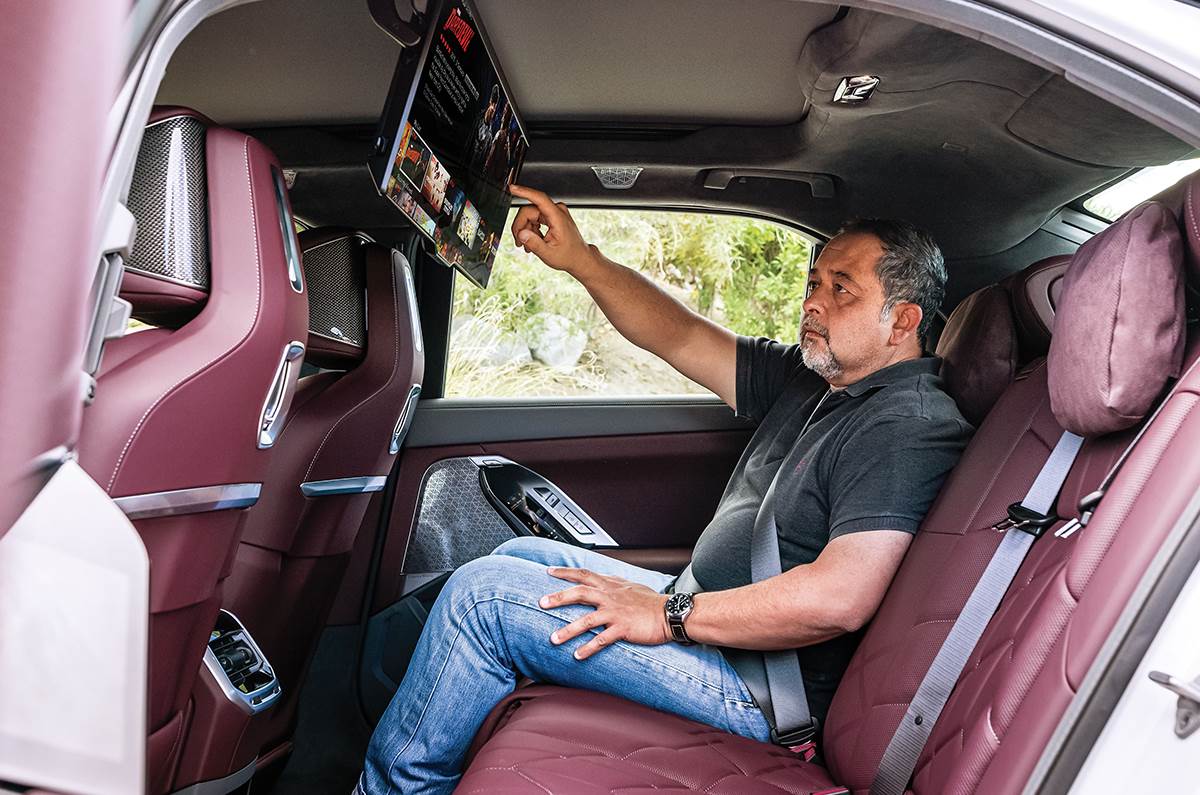
There is room for improvement, as on anything so new. The screen is a bit close for some and if you tend to get car-sick, the screen will only make things much worse. There is only a small gap under the screen for visual reference of the road. Drivers also have a massive blind spot once the theatre is activated, but this can be fixed with a rear-facing camera feed automatically popping up. Still, BMW has solved the ‘what to do in a traffic jam’ once and for all. How well it works with our poor roads remains to be seen.
Seat comfort is also a big step up. The seat height is just right on the new 7, if a bit low on the i7 with the battery under the floor. The seat is long in squab and supportive, and with the adjustable Ottoman leg rest and rear backrest, you can really kick back and enjoy a relaxing theatre experience. The rear seat is contoured more for comfort than for sporty driving. You also have the huge panoramic sunroof and BMW’s Sky Lounge at night, replete with LED light threads on the massive glass pane above.
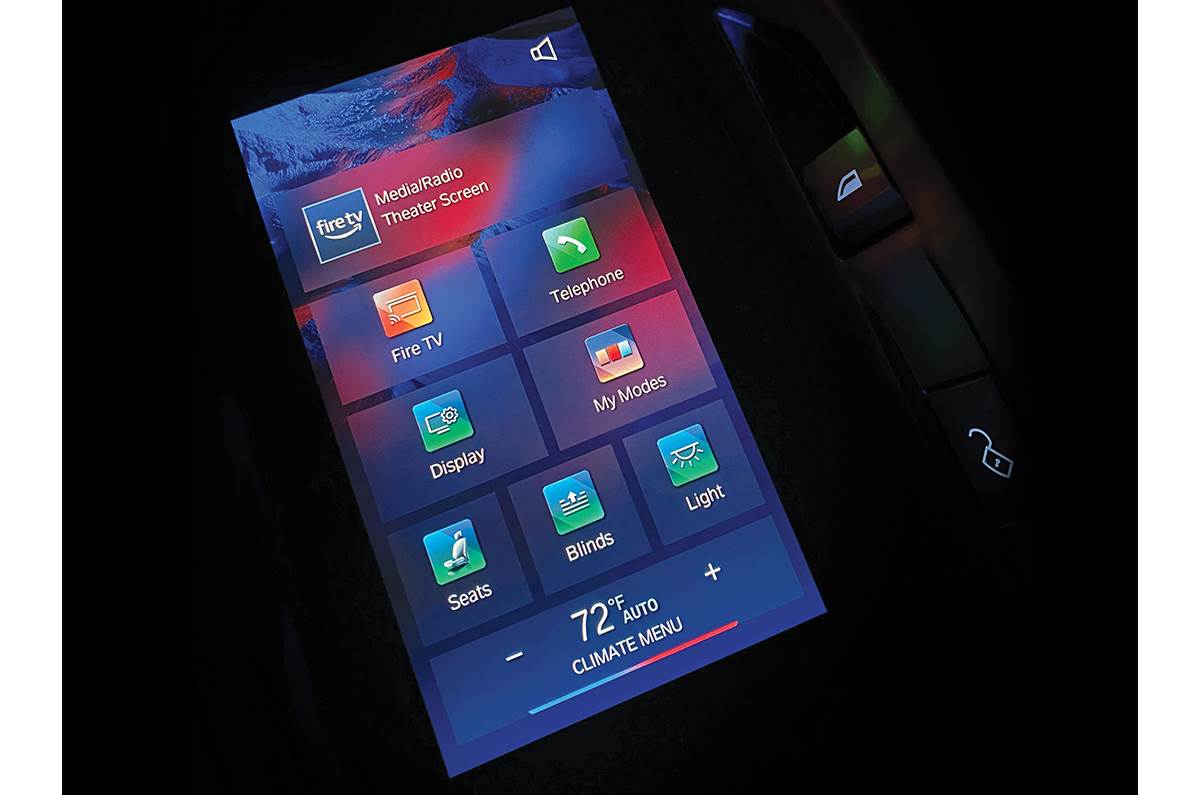
Reposed in the rear seat, I also take a long hard appreciative look at the dash. It isn’t Bentley or Rolls plush and you don’t have an abundance of burr walnut, leather or chrome. In its place, however, is an edgy style that is very modern. Think modern designer interior versus a more traditional Victorian look. The basic construction of the flat dash is similar to the concept car like iX, and it gets BMW’s curved display as well.
What sets this cabin apart is that inch-and-a-half thick bright LED bar – stretched across from door pad to door pad – with a crystal-like cover with folds and wedges on top. The ‘Interaction Bar’ lights up in bright colours in accordance with driving modes or in sync with mood lighting. It even flashes warnings, in case you are about to open the door and there’s traffic approaching close to the car.
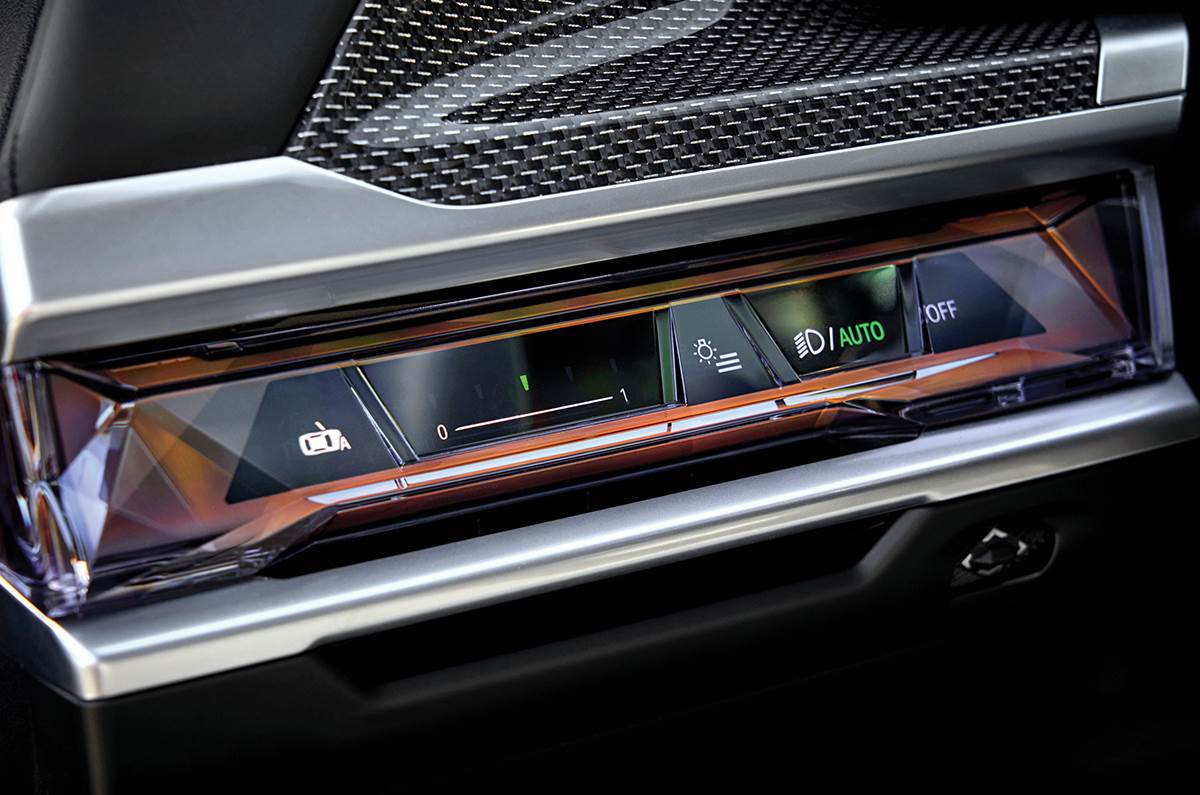
Also neat is the fact that the vents are hidden from view; they are tiny slits placed under the light bar. Have to see how well they will work in our hot conditions where a good air volume is essential. What also looks and feels extremely sophisticated is the use of vegan leather and Merino wool, the floating centre console looks cool and there are crystal inserts for added bling as well. You can even open all four doors at a touch of a button, or ask the car to do it via voice commands. So plenty of cool new stuff here, and a real modern luxury vibe.
BMW 7 Series, i7: exterior and techincal specs
As I step out and do a walk around the new 7, I’m immediately drawn by the fresh clean look. This is a striking car with a very clear and unique identity. The strong shoulder line catches the light beautifully and what helps enhance the impression of length is that the line gives the impression that it runs as straight as a die. The skinning of the new 7 also is a clear departure from earlier cars. Sculpted to give it a block-like feel, it is replete with flat surfaces and chamfered edges, for the ‘hewn from a single block’ look.
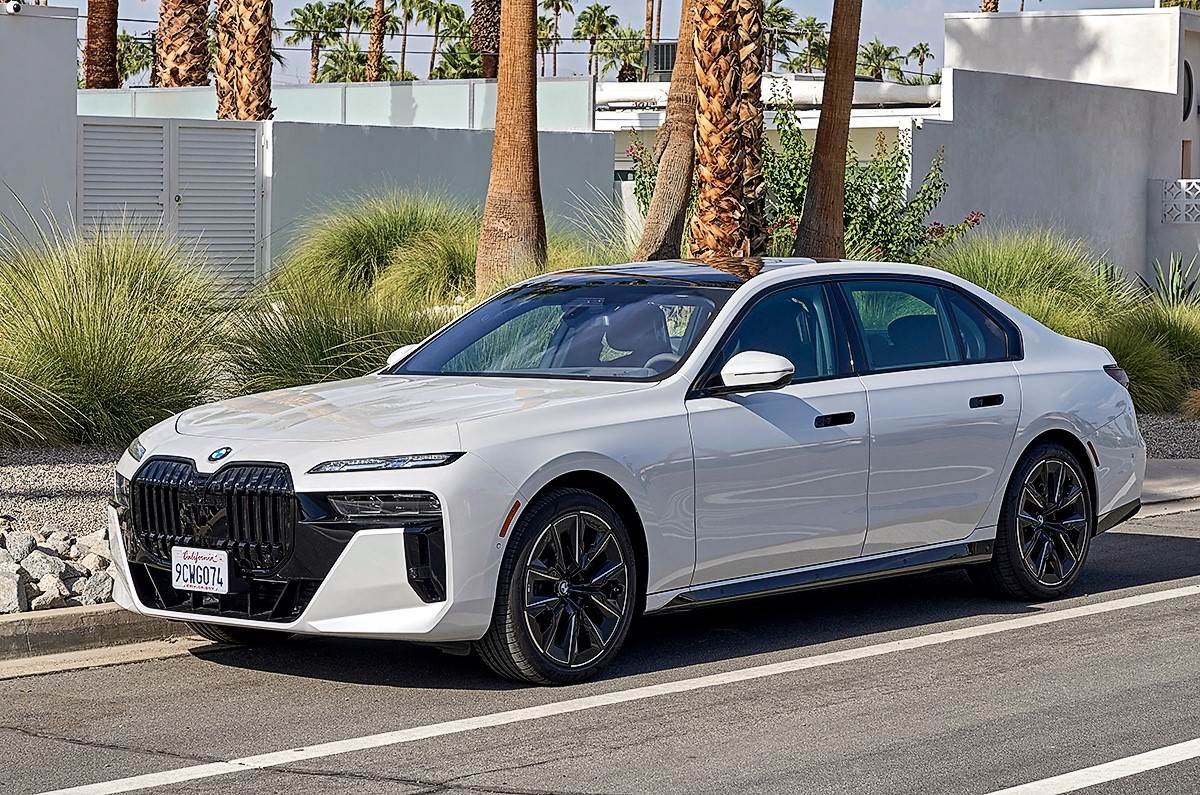
The long flat bonnet and raised boot give it a continuity that is visually pleasing, and though the rear lamps are simple and don’t get BMW’s ‘L’ motif, they are sharply designed and suit the design well. It isn’t easy to tell the electric i7 from the regular 7. But look closely and you will see some blue highlights on the lights and other surfaces. Also, the grille isn’t real, and since it is an EV, it gets more aero-efficient alloys.
The multi-layered nose, in typical BMW fashion, is radical and done to polarise opinion. The split headlamps lend tremendous visual depth, but BMW’s big kidney grille won’t be to everyone’s taste. At least initially. The new 7, like other BMWs, is likely to be an acquired taste. The new 7 is also the largest BMW yet; it is close to 5.4 metres long and looks much bigger and more substantial on the road than its predecessor. The i7 is also seriously heavy too; it weighs in at 2,715kg due to the large battery. Built on a modified version of BMW’s CLAR platform, the new 7 and i7 feature increased body rigidity, larger wheels and wider tracks.
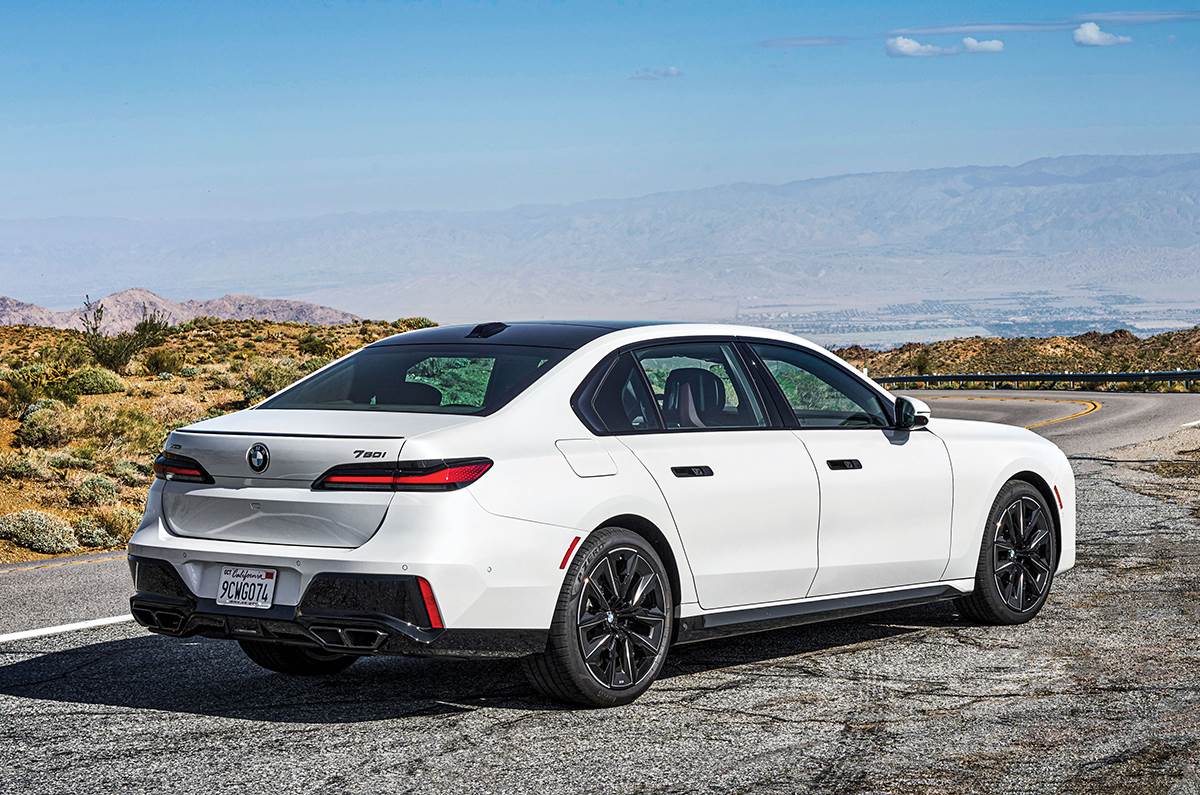
The platform’s double-wishbone front and five-link rear axle have also undergone an extensive upgrade to help handle the additional cornering loads. Apart from dynamics, the new 7 has also got many comfort-oriented enhancements. An elastic mounting has been fitted on the front sub-frame to improve acoustic properties and there are new hydro mounts for the rear axle sub-frame. The new 7 gets two-axle air suspension with electronically controlled dampers and automatic self-levelling.
The suspension’s air supply is controlled individually for each wheel and the 48V hybrid system also helps with faster reaction and switching for drive systems like the active anti-roll bars and the rear wheel steering. The suspension can also be raised by 20 millimetres and the new dual-acting rear dampers, BMW says, provide significant improvement in ride quality over small bumps and ridges on the road. The dampers adapt their responses both to road surface conditions and to driving style, with compression and rebound stages adjusting smoothly and independently.
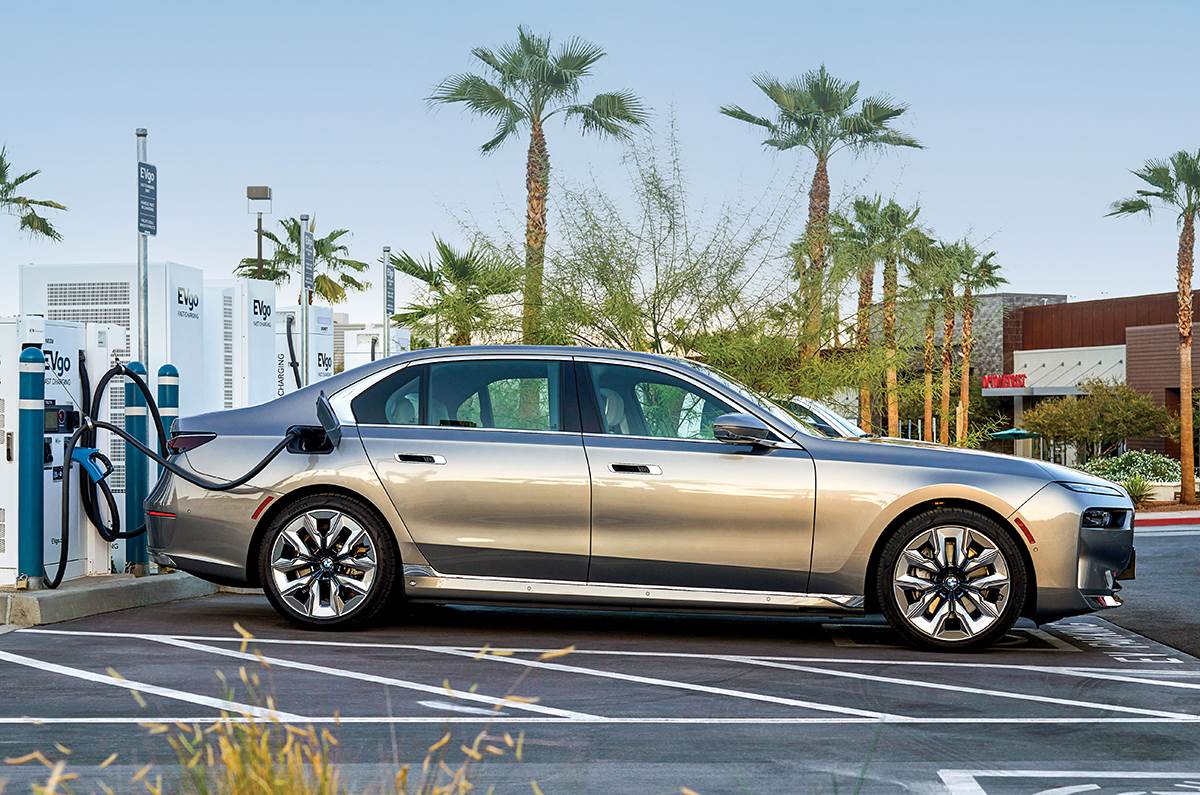
The electric i7 also comes with a huge 101.7kWh lithium-ion battery mounted within the floorpan. It delivers around 5.26km per kWh, giving it an official range of between 591-625km on the WLTP test cycle. BMW also says that it went to great lengths to ensure that the best and worst range scenarios for the electric i7 are as close together as possible. The company is claiming a difference in the best and worst range of just 75km. BMW also says the ‘Gen 5’ electric motors don’t use permanent magnets, and hence, do not contain ‘rare earth’ materials.
BMW 7 Series, i7: ride and handling
The new 7 Series has benefitted a lot from Rolls Royce, which is also owned by the BMW Group. So says vice president for engineering and 7 Series chief Robert Kahlenberg. He should know, as he’s headed and signed off a whole bunch of Rollers. The difference in character comes out as soon as I set off. Wow, the new 7 rides well. That little bit of stiffness a 7 always seemed to have in the suspension has been done away with and you get the impression that BMW engineers are now no longer chasing 5 Series-like driving manners.
The air suspension, active dampers and active anti-roll bars are all wired tight to a central brain and making them work in sync is what allows the ride to be supple, absorbent, silent and flat; no unnecessary up and down tossing experienced. The 7 and i7 both even seem to have aced low-speed rides over broken roads. A much tougher test will follow on our roads, but this clearly is a new high for a 7 regardless.
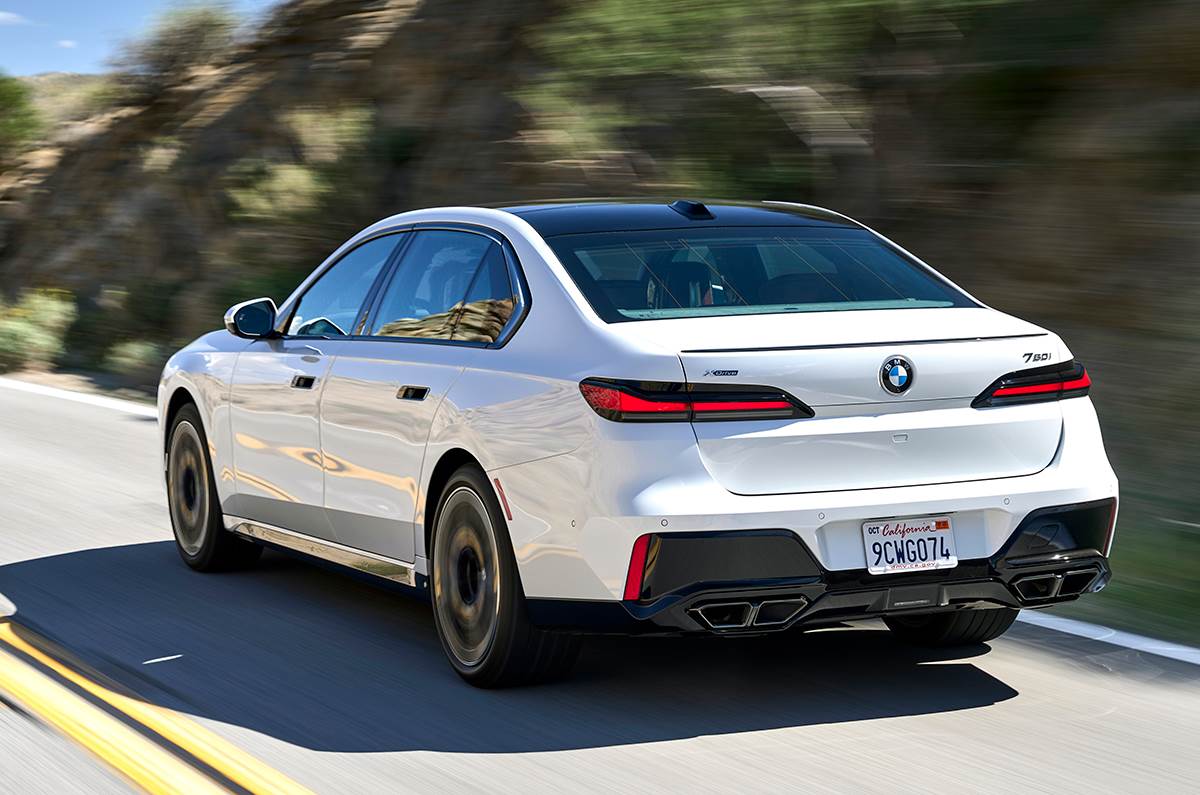
The stable platform, rear directional control and semi-active suspension also help when it comes to going around corners. Yes, you do feel the size and weight, and no, the new 7 doesn’t shrink around you or resemble a 3 Series, but with such strong fundamentals, good grip and steering that weighs up nicely in Sport, the new 7 manages to convey both stability and plenty of eagerness and agility. So even enjoying a tight and twisty mountain road comes naturally, and the 7 even holds up well when being driven in a more committed and playful manner.
BMW has also nailed the complex electric car dynamic equation. The i7, if anything, feels even more agile, more willing to turn in and happier to power out of corners. And in some markets, where it is legal and the roads are well marked, BMW even offers real Level 3 Autonomous driving. The driver, however, still needs to be alert for a multitude of unforeseen events that regularly seem to crop up. When it comes to refinement, there is also some amount of wind noise on both cars – especially around the mirrors – and taking on the S Class, when it comes to refinement, won’t be easy. Still, BMW’s new 7 and i7 have clearly closed the gap.
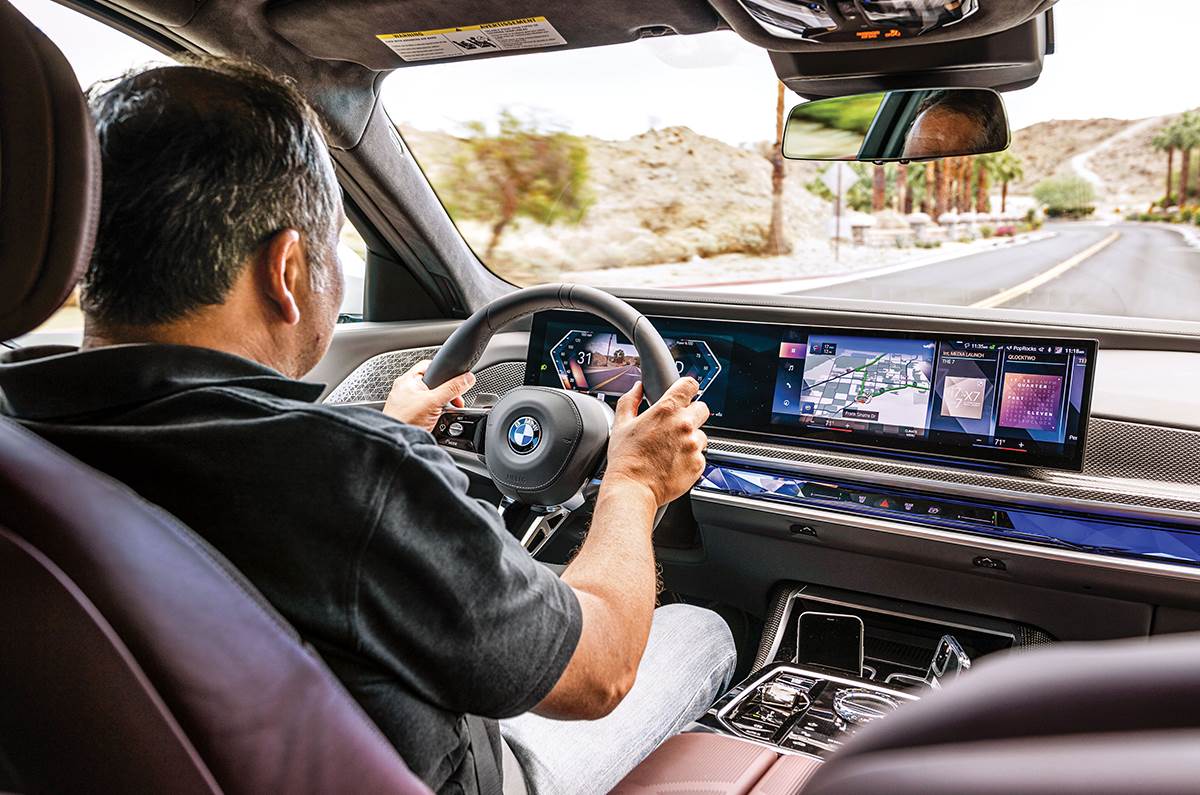
The i7 even has a good set of legs – 544 electric horses are sent down to four wheels and 100kph comes up in just 4.7 seconds. Remember, this car weighs 2.7 tonnes. And BMW has even managed to metre out the power in a nice and linear manner; no big spike followed by a quick flattening off. The new 7 also feels easy to drive in downtown Palm Springs traffic. It’s quick off the mark, but smooth. There’s a nice bulge of torque after the initial bit of response and then the ramp up in pace is always more than you expect; exactly what you want. At and above freeway speeds, the i7 doesn’t feel quite as accretive as a regular combustion engine car as it isn’t geared for higher speeds.
The new petrol-hybrid 760 is now a twin-turbo V8 rather than a V12, but it gets an 18hp and 200Nm electric boost from a 48V system. The new petrol also delivers a strong and very sporty driving experience. The engine has been worked on by the M division and there are new turbos, an updated engine oil system and cooler running air intakes. The result is a car that responds sharply in Sport and delivers a strong step off when you put your foot down.
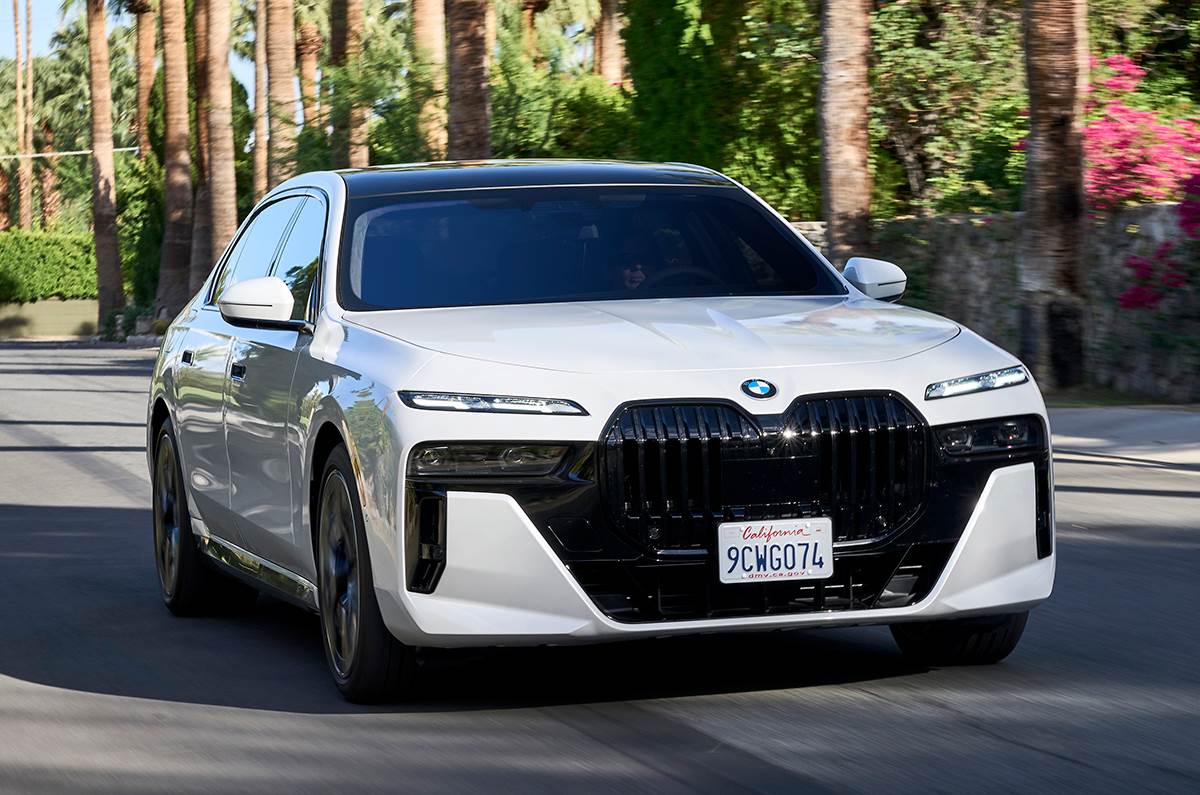
In fact, the petrol hybrid is faster and takes 4.2 seconds to 100 as against 4.7 seconds of the i7 EV. It even runs all the way upto 250kph. The i7 isn’t too far off though; it does a limited 240kph. Where it truly eats up the electric, however, is in mid-range grunt and elasticity. Put your foot down at just about any speed and the V8, with the help of the electric boost and a quick-acting gearbox, delivers a slug of torque and performance that’s more M car than a limo. And that just gets you smiling. Even love the manner in which it effortlessly pulls forward on a light throttle, the V8 burbling away in the background.
When it comes to driver assistance systems, BMW has a unique feature bundled along with its level-3 autonomous driving mode. Known as Parking Assistant, the car can remember the often tortuous and tight path into your parking, even managing a 650-metre long run on its own.
BMW 7 Series, i7: verdict
BMW’s new 7 has closed the gap to the Mercedes-Benz S-Class: this much is clear. Much more of a luxury car now, it delivers levels of comfort that are up there with the best, it has loads of individual character and even manages to endear itself to keen drivers. Factor in the funky new interior, some genuinely new and appealing features, and the fact that it is propulsion agnostic – you choose between a petrol-hybrid or EV powertrain – and you have a luxury car that sits right at the cutting edge.
The new 740i has gone on sale for Rs 1.70 crore while the i7 tested here has priced at Rs 1.95 crore in India; it is a car that has what it takes to go up against the best car in the world and give it a run for its money. Don’t look in the rear view mirror Mercedes, BMW’s new 7 is right alongside.
Also See:
2023 BMW 7 Series, i7 video review
























